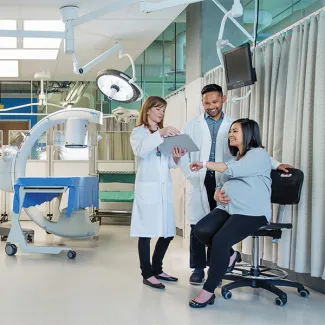Essential health-care skills to succeed in clinical management

Health-care leaders play a pivotal role in clinical management, taking on multiple roles and drawing on diverse skill sets to deliver high-quality patient care. These leaders organize, plan and direct their team members to provide patient-centred care – all while creating a healthy workplace environment and improving efficiencies.
New models of clinical care in British Columbia
Around the world, many health-care systems are undergoing processes of transformation. The pressures of population growth, new technologies, shortages of health-care workers and limited budgets are all putting pressure on an already stretched system.
Here in British Columbia, the primary care system is undergoing a transformation as the provincial government attempts to alleviate the acute shortage of primary physicians and specialists, and to ensure British Columbians can access the care they need in a timely fashion.
The province is investing in urgent and primary care centres, community health centres, First Nations primary care centres, Foundry Centres and other similar clinics. These sites often aim to bring together interdisciplinary teams of health-care clinicians who offer one-stop shop or wraparound services to clients.
The role of clinical managers
Health-care leaders with expertise in clinical management are needed to help guide the development and implementation of these and other new models of care, both here in BC and beyond.
Successful leaders in this field often have extensive frontline experience as clinicians in health-care practice, and this lived reality gives them invaluable insight as they advance into positions of responsibility and influence.
Leaders need to complement this experience with in-demand skills that include an understanding of business and accounting, strategy development, project management and best practices in organizational development. They also require communication and negotiation skills to bring together many different stakeholders to find common ground and sustainable paths forward. Finally, clinical management leaders also require a strong understanding of policy and its crucial role in establishing standards of care and guiding action.
A master’s degree in clinical education and management
UBC’s Master of Health Leadership and Policy (MHLP) in Clinical Education was designed for early- and mid-career professionals with relevant work experience as clinicians who want to gain the wide-ranging knowledge needed to work at the forefront of the transformation in clinical management in health care. The interdisciplinary curriculum balances clinical practice and business management. A common theme woven through all the courses is change management. Courses on clinical education, curriculum development and evidence-based practice help students gain the skills to create workplace environments where team members are supported to take risks, shift their current practices and embrace change.
“Learning about quality improvement is another way change happens. Quality improvement methods offer concrete processes that focus on breaking down a complex situation into very small pieces" says former Program Director Dr. Elisabeth Bailey.
Health-care professionals can use and apply these tools to improve the experience of practitioners and patients,” she adds.
A vibrant professional network of clinical managers and leaders
The program attracts a range of health-care professionals, including nurses, social workers, physicians, occupational therapists and others who work in the health-care sector. These professionals are ready to move into clinical management or other leadership positions, and they recognize that the MHLP in Clinical Education – with its interdisciplinary focus that brings together clinical experience and business – is a powerful way to do that. A focus on group project work, and the discussion-based pedagogy of the courses, enables clinicians to share experiences and learn from peers across different specialties. This interdisciplinary approach enriches the learning experience, allowing for a broader understanding of the health-care landscape. It also allows for the development of a strong professional network. Students learn from the other students in their cohort, and the program also deliberately creates other pathways to forge both informal and formal connections with local industry leaders.
“To broaden students’ awareness of the challenges across different contexts, we bring in experts in the field – from the Ministry of Health and in practice – to share their insights,” explains former Program Director Dr. Cheryl Segaric.
“The practicum experience, which is a requirement of the program, also opens up opportunities for students to connect with industry leaders and apply their skills in a specific area they are passionate about,” she adds.
Clinical managers are in high demand
Health-care professionals with the skills to step into clinical management roles are highly sought after by employers. In projections of the most in-demand professions, medical and health services managers are almost always at the top of the list. These are jobs that are both high growth (in terms of year-over-year growth) as well as having the most positions overall.
Canada’s Job Bank ranks prospects in this field in the top two categories of “good” or “very good” for nine of Canada’s 10 provinces, while BC’s WorkBC analysis categorizes health management as a high opportunity occupation.
Clinical Education graduates are succeeding, with many moving into leadership roles within BC’s health authorities or in health care settings. One example is Nikko Asistio, who after graduating immediately took on the position of clinical operations manager for two urgent and primary care centres in Surrey, overseeing a staff of 50 that includes physicians, nurses and other health-care professionals.
“My job is all about bringing together the clinical side with operations,” he says. “I make sure the operations run smoothly – whether that’s getting new equipment or finding funds to hire on additional staff – so my staff can safely do their jobs, and the patients receive the best care possible.”
Nikko has since continued to advance in his career and is currently the Director of Operations, Primary Care for Richmond Community of Care. Graduates move into other positions too. “We’ve seen that the MHLP in Clinical Education is a springboard for multiple career pathways, with our graduates being hired as clinical educators and clinical leaders, as well as senior leaders in quality and safety initiatives, and in project management,” says Dr. Segaric.
Opportunities for leaders in clinical management – in BC and beyond
Clinical management leaders have a unique opportunity to guide the critical transformation of sites within our health-care system, supporting the resiliency and overall sustainability of the sector. They combine the clinical practice knowledge with the strategy development, project management and communication skills needed to empower interdisciplinary teams of practitioners to deliver patient-centred care. Professional master’s degrees like UBC’s Master of Health Leadership and Policy provide forward-thinking and compassionate individuals with the skills needed to move into leadership positions in a range of roles in both the private and public sector, in hospital settings and in the community. This is thanks to:
- an interdisciplinary curriculum that combines clinical practice and business knowledge
- a practicum where you will work directly with an industry partner to develop a solution to a real-world problem
- industry networking opportunities throughout the year
- learning alongside other professionals like yourself, from all over Canada and the world, who bring impressive experience to their studies
- the opportunity to pursue your Certified Health Executive certification, the only designation for health-care leaders in Canada
For alumni, the MHLP in Clinical Education bridges the gap between clinical expertise, business acumen and leadership, empowering them to work for change and transform health care for the better.
Graduates are quickly able to take on leadership positions where they influence policy, drive innovation and implement changes that improve health-care delivery. As importantly, they have the confidence to successfully navigate the complexities of resource and budget constraints while putting patient needs first and ensuring work environments are welcoming and rewarding places for staff to thrive and grow.






